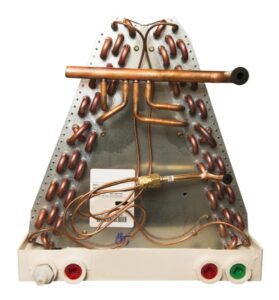An air conditioning system has many different parts that combine together to provide cool comfort for a house. The part of an AC that does the direct cooling of the air is the evaporator coil, which works in conjunction with a second coil, the condenser coil, to allow for the heat exchange process that’s at the core of how an air conditioning system works.
Today, we’re going to look closer at how these coils work, as well as how they may end up requiring professional AC repair in Lake City, FL.
Heat Exchange
Heat exchange is the method an air conditioner uses to provide cooling. In simplest terms, it means the movement of heat from one place to another. An air conditioner removes heat from the air inside a house and then deposits the heat outside. This is why you feel heat blowing out from the condenser unit outside when the AC is running. The coils are the two places in an AC where direct heat exchange occurs.
To carry out heat exchange, an air conditioner circulates a chemical refrigerant blend. The refrigerant moves through the two sets of coils where it absorbs heat (the indoor evaporator coil) or releases it (the outdoor refrigerant coil). Blower fans move air over the coils to facilitate the movement of heat into or out of the coils.
The two coils are made from aluminum or copper, which conduct heat easily. The coils are designed to spread out the refrigerant as much as possible for it to interact with the temperature around it. The coils are usually made in a zigzag pattern with u-shaped bends at the end.
Dirty Coils
One of the most common problems that air conditioner coils face is an accumulation of dirt and grime along their surfaces. A dirty coil cannot carry out heat exchange effectively because the dirt and grime create an insulating layer.
Because the condenser coil is housed outside, it’s exposed to the elements and can become dirty over a season. This is one of the reasons we recommend our customers have regular maintenance for their air conditioner in spring: during maintenance, our technicians will check the outdoor coil and clean it if necessary. If the condenser coil cannot release enough heat, the AC will lose efficiency and may even overheat and shut down.
The evaporator coil can become dirty as well, especially if the AC’s filter isn’t changed regularly. When the evaporator coil becomes dirty, it limits how well the AC can cool the air. It also may cause the coil to freeze over because the refrigerant inside it will remain too cold and begin freezing moisture along the coil’s surface.
Damaged, Leaking Coils
The coils can sustain damage as well as corrode, and both situations can cause them to leak refrigerant. Loss of refrigerant puts the entire air conditioning system in danger of breaking down. Often, the coil assembly will need to be replaced when it leaks.
Call Touchstone Heating and Air 24/7 for exceptional customer service! Serving the communities of North Central Florida since 1998.

